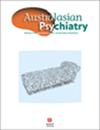Response to workplace aggression in forensic and secure mental health services: Investigating staff confidence, associated factors, and training needs
IF 1.2
4区 医学
Q4 PSYCHIATRY
引用次数: 0
Abstract
ObjectiveTo evaluate forensic and secure mental health services (FSMHS) staff’s confidence in managing workplace aggression, identify associated factors, and explore their workplace aggression prevention training needs.MethodsThrough an online survey, staff rated their experience of workplace aggression, perceived effectiveness of current training, and confidence in responding to workplace aggression, and described training needs. Stepwise multiple regression was used to identify associated factors with statistical significance. Thematic analysis was used to generate themes describing their training needs.ResultsThe staff perceived current training as low-to-medium in effectiveness, mirroring their confidence in managing workplace aggression. Nurses experienced more workplace aggression compared to other professions. Staff working at High Security perceived current training as less effective compared to those working at Medium Security or Low Security. Qualitative findings underscored the necessity for improved training content, methods, and supportive strategies.ConclusionRecommendations for enhancing training include: tailoring training to FSMHS settings; equally focussing on both non-physical and physical intervention techniques; providing more scenario-based hands-on practice opportunities; delivering training in a reasonable trainer-trainee ratio; prioritising nurses and High Security staff and integrating other professions into the training framework; and implementing strategies that support staff, consumers, and environment to ensure training effectiveness and applicability.法医和安全心理健康服务机构应对工作场所侵犯行为的措施:调查员工的信心、相关因素和培训需求
目标评估法医和安全精神卫生服务机构(FSMHS)工作人员在处理工作场所侵犯行为方面的信心,确定相关因素,并探讨他们在预防工作场所侵犯行为方面的培训需求。方法通过在线调查,工作人员对他们在工作场所侵犯行为方面的经历、对当前培训有效性的感知、应对工作场所侵犯行为的信心进行评分,并描述培训需求。采用逐步多元回归法确定了具有统计学意义的相关因素。结果员工认为当前培训的有效性从低到中等,这反映了他们对处理工作场所侵犯的信心。与其他职业相比,护士受到的工作场所侵犯更多。与中度或低度安保人员相比,高度安保人员认为当前培训的有效性较低。定性研究结果强调了改进培训内容、方法和支持性策略的必要性。结论加强培训的建议包括:根据密克罗尼西亚联邦医疗服务体系的环境调整培训内容;同等重视非身体干预和身体干预技术;提供更多基于情景的动手实践机会;以合理的培训师与受训人员比例提供培训;优先考虑护士和高度警戒人员,并将其他职业纳入培训框架;实施支持员工、消费者和环境的策略,以确保培训的有效性和适用性。
本文章由计算机程序翻译,如有差异,请以英文原文为准。
求助全文
约1分钟内获得全文
求助全文
来源期刊

Australasian Psychiatry
医学-精神病学
CiteScore
2.80
自引率
5.60%
发文量
159
审稿时长
6-12 weeks
期刊介绍:
Australasian Psychiatry is the bi-monthly journal of The Royal Australian and New Zealand College of Psychiatrists (RANZCP) that aims to promote the art of psychiatry and its maintenance of excellence in practice. The journal is peer-reviewed and accepts submissions, presented as original research; reviews; descriptions of innovative services; comments on policy, history, politics, economics, training, ethics and the Arts as they relate to mental health and mental health services; statements of opinion and letters. Book reviews are commissioned by the editor. A section of the journal provides information on RANZCP business and related matters.
 求助内容:
求助内容: 应助结果提醒方式:
应助结果提醒方式:


